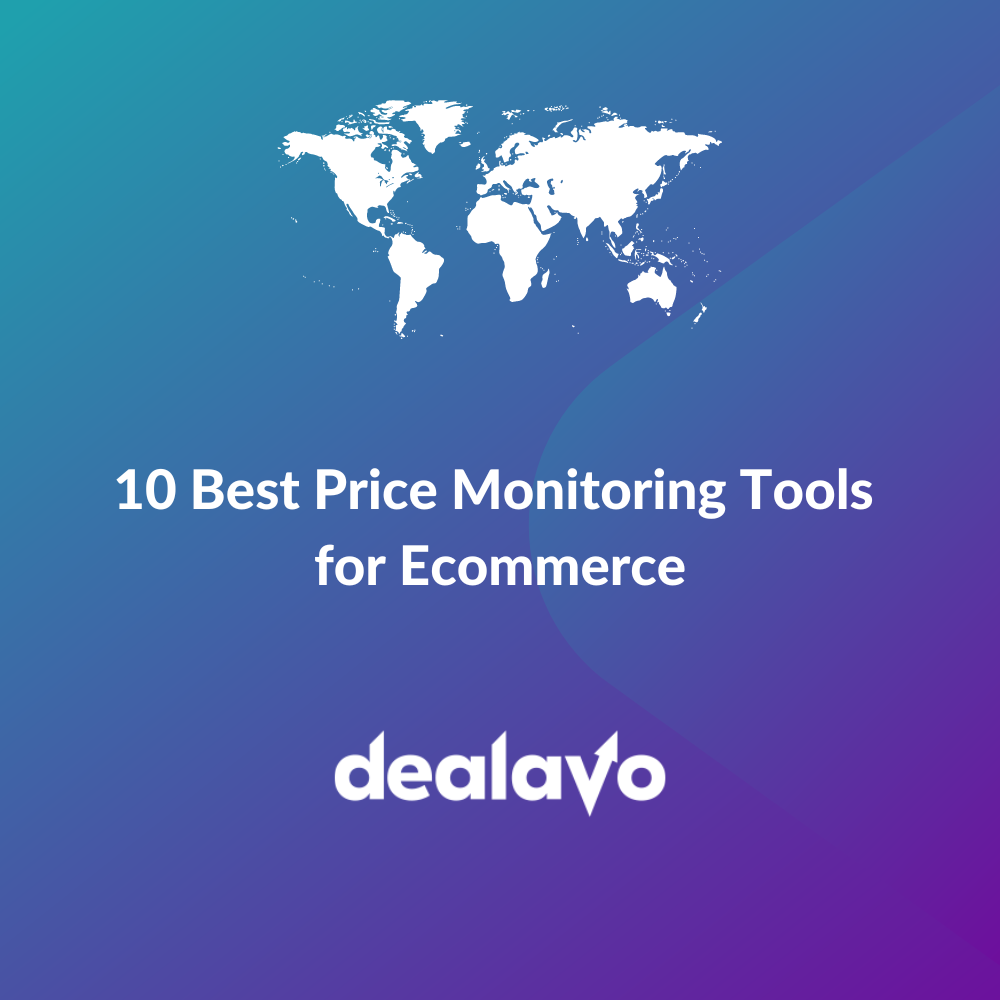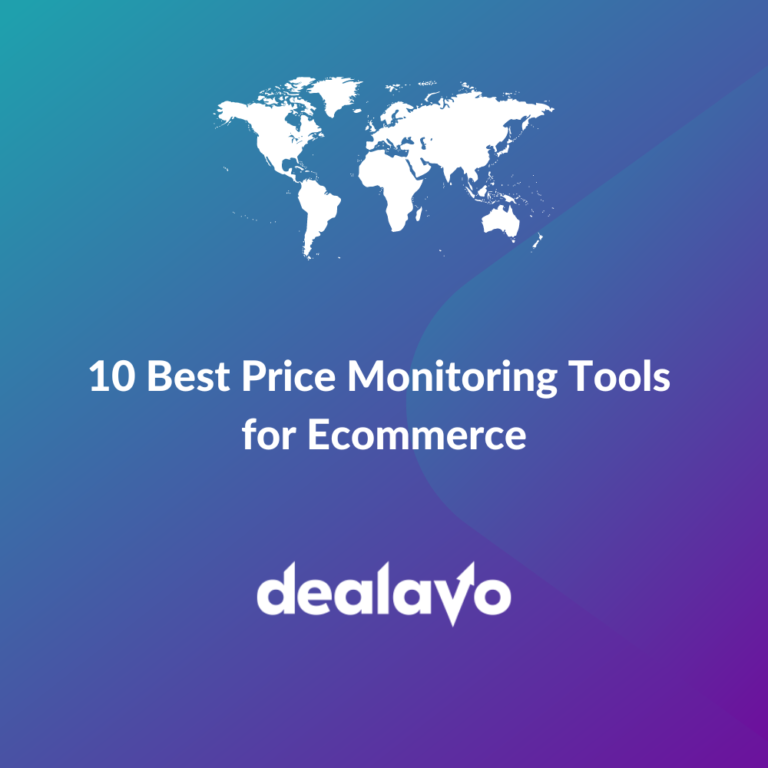The Importance of ERP Integration for E-Commerce Businesses
- 12 June 2024
One of the key strategies to achieve high degree of efficiency and accuracy in e-commerce business is to integrate one’s e-commerce platform with an Enterprise Resource Planning (ERP) system. But what exactly does ERP integration entail, and why is it so vital for e-commerce businesses? Let’s dive into the main concepts of ERP integration from an e-commerce perspective.
What is ERP Integration?
ERP systems are pieces of software that help companies automate processes and link together their finance, HR, marketing, and other sections for a more comprehensive way of analysing and managing the data.
ERP (Enterprise Resource Planning) integration refers to the seamless connectivity between an e-commerce platform and an ERP system. An ERP system is a suite of integrated applications that a business uses to collect, store, manage, and interpret data from various business activities. By integrating these systems, e-commerce businesses can streamline their operations, ensure real-time data accuracy, and enhance overall productivity.
There are several ERP systems to choose from, but typically, most of them include distinct modules for finance, HR, supply chain, inventory management, and more. Linking them with your e-commerce platform (let it be some accounting software or price monitoring software, like Dealavo) enables a smooth data flow between your systems.
Thanks to the implementation of ERP systems, information such as sales data, inventory levels, and customer details is automatically synchronized, reducing the need for manual data entry and minimizing errors.
Key Benefits of ERP Integration
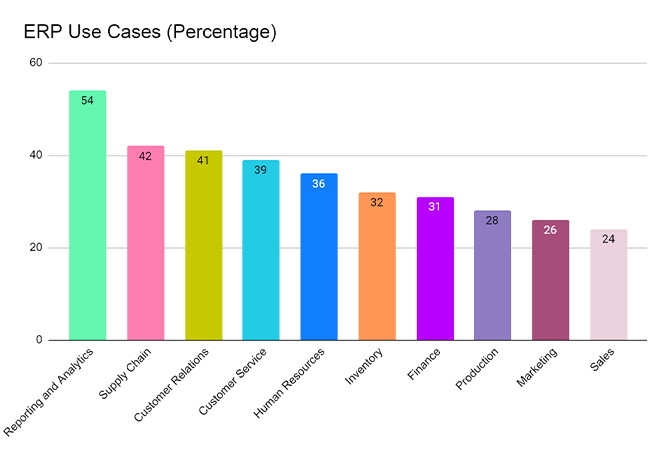
The benefits of ERP integration are numerous. Ranging from time-saving on various processes, to higher accuracy and precisions of the analysis of the data collected – ERP systems will simply get you covered in the dynamic e-commerce environment.
Let us try to analyse at least the most important of the advantages that come from leveraging ERP system integration in e-commerce. Of course, some of these may differ a bit, depending on the type and the method of the integration that you choose for your business.
Streamlined Operations
Regardless of how you’d see your ERP integration to work, it will surely smoothen most of your business processes and operations, reducing the risk of errors and freeing up time for employees to focus on more strategic tasks.
Automating workflows such as order processing, inventory management, and shipping makes the entire process faster and more efficient. For example, when a customer places an order, the right system can automatically update the inventory, initiate the packing process, and even trigger shipping, all without any manual intervention.
Improved Data Accuracy
Should you need bulk data analysis and wish it would yield accurate results and information-rich insights, ERP integration can also help you with that, ensuring data consistency across all platforms
Having consistent data across all of your platforms reduces the risk of errors and discrepancies, leading to more reliable business insights and better decision-making. For example, with accurate sales data at your fingertips, you can analyse your product performance and see which one does better than the other.
Enhanced Customer Experience
Faster order processing and fulfilment lead to quicker delivery times, improving customer satisfaction and loyalty. In the fast-paced world of e-commerce, customers expect quick and accurate information about product availability, order status, and delivery times. ERP integration provides real-time updates, ensuring that your customers are never left in the dark about their orders.
Better Inventory Management
ERP integration usually also provides a holistic view of inventory levels, helping businesses manage stock more effectively and avoid overstocking or stockouts. Automatic reordering and stock level alerts ensure that popular products are always available.
Overstocking blocks capital in unsold goods, while stockouts can lead to missed sales opportunities and dissatisfied customers. ERP integration offers a solution to these challenges.
Informed Decision-Making
ERP integration centralizes data from various departments, providing a holistic view of your business operations. With detailed analytics and reporting capabilities, you can track key performance indicators (KPIs) and identify trends that impact your business.
For instance, you can review financial reports to assess your company’s profitability. The insights you receive thanks to ERP integration enable you to make data-driven decisions that align with your business strategy.
Implementation Considerations
The complexity and vast array of ERP integration options create a need for careful considerations regarding all the pros and cons when making the final decision about implementing a specific ERP system.
Implementing ERP integration involves, first, selecting the right ERP system, then customizing it to fit your business needs, and finally migrating data accurately, and providing training and support to your team.
Choosing the Right ERP System
When choosing your ERP system, you will need to think about such aspects as: your business needs and goals, the ERP system’s scalability and compatibility with what your business already uses, and it would also be good to consider the system’s ease of use (you don’t want something your team won’t understand, right?).
Additionally, you can also check your future ERP system’s support services. It is always good to have a solid backup option when you stumble upon some problems, and if the support quality is poor, it may mean potential money loss for your business.
There are multiple ERP systems to choose from, depending on what is your industry and business objectives. Let’s have a quick look at the most common types of possible ERP integrations.
Pricing Management Software
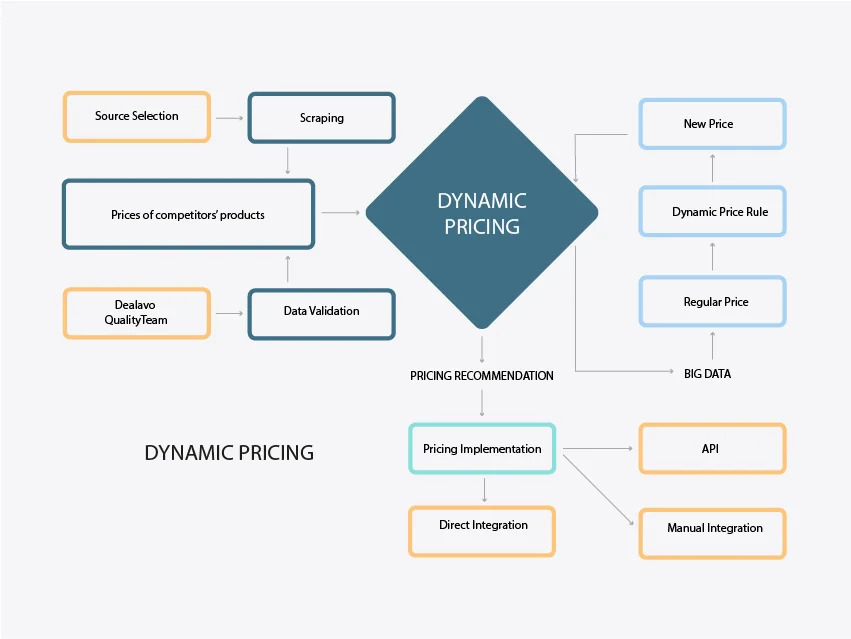
This is a crucial group of tools that every e-commerce company should leverage to scale and grow efficiently. Price monitoring and competition tracking e-commerce tools can automate time-consuming procedures regarding product price configuration and campaign planning.
There are several price monitoring tools with ERP integration out there, and Dealavo is one of them. Our Dynamic Pricing feature with AI-supported repricing and intuitive, customisable price alerts will take your competitiveness to another level. Apart from ERP system integration, we also provide you with a wide selection of integrations via API, so that your e-commerce business will have everything it might need to stay ahead of its rivals and conquer the market.
Business Intelligence
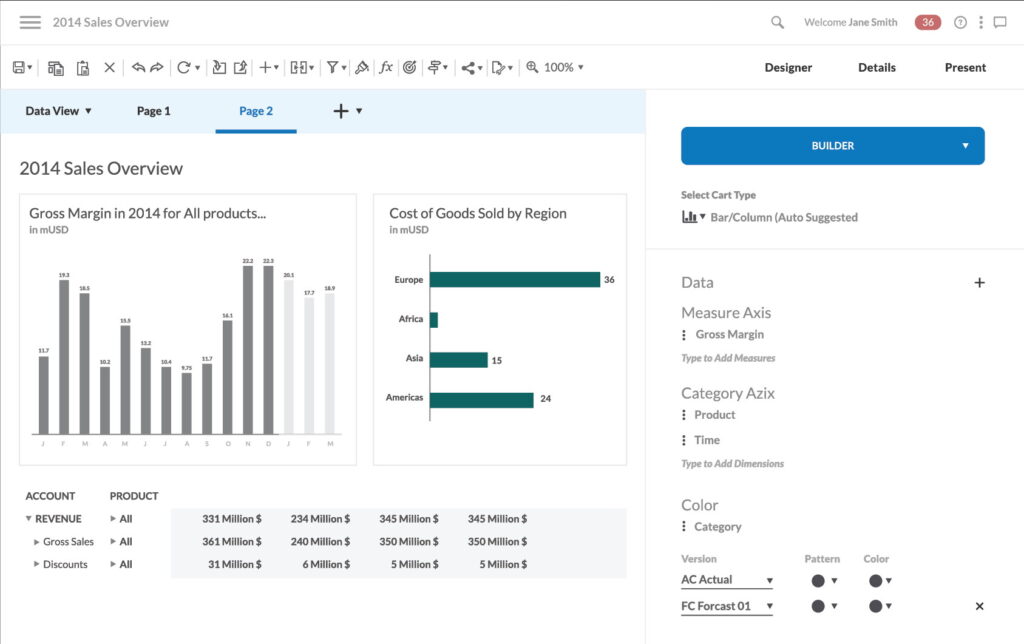
SAP consists of several modules for smooth business management, source: g2.com
Business Intelligence (BI) tools provide e-commerce companies with much vital information regarding the overall functioning of the business. Integrating business processes with ERP systems allows access to comprehensive reporting. With cloud business intelligence services, you can more easily share the insights coming from the data collected by the software with those in power to make appropriate moves regarding the company.
An example of a BI software is SAP BusinessObjects Business Intelligence. It’s a complex feature suite for companies to manage a large amount of data and make quicker and more precise, data-based decisions. The software provides you with a wide selection of services that include supply chain management, cloud analytics, audit management, SAP Business Integrity Screening, and many other useful functionalities.
Accounting Software
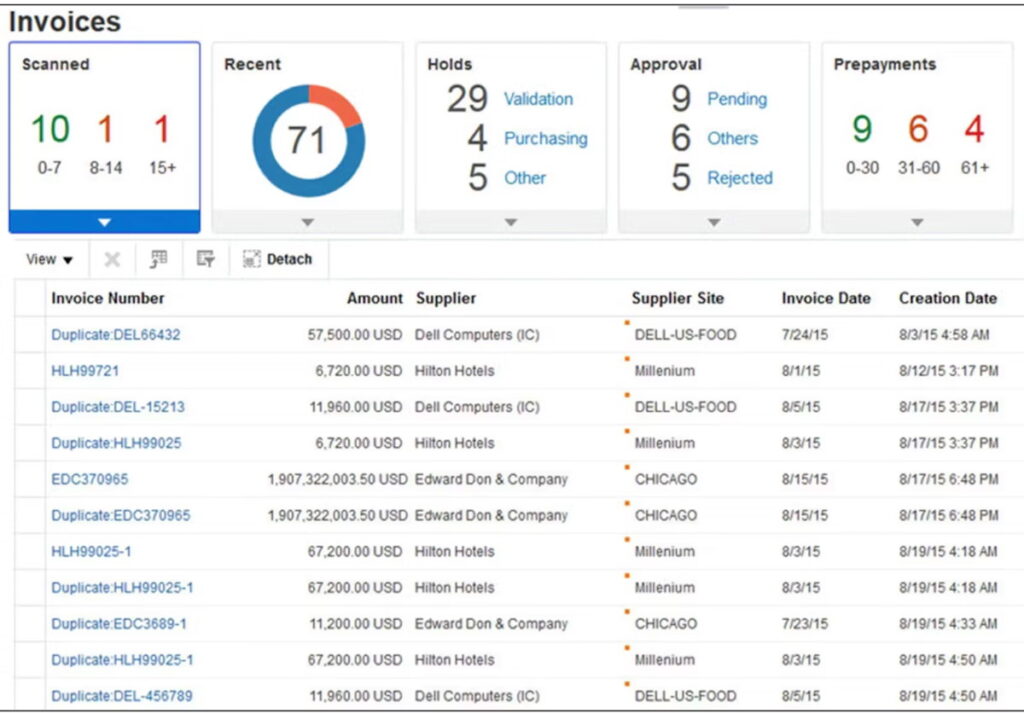
Oracle Financials with cloud services, source: getapp.co.nz
You can also use the power of ERP systems to smoothen the financial processes within your company. It’s also worth noting that using ERP integration as a way to manage all the financial data is quite a fresh solution.
Oracle ERP is, in fact, a multi-faceted ERP system, but what it excels in are its finance-related features. Oracle Financials provides you with a full overview of your financial situation, which enables you to respond quickly to the dynamically changing business environment. It features, for example:
- expense management,
- joint venture management,
- reporting and analytics section,
- revenue management.
Planning and Customization
There’s no appropriate ERP integration process without a good integration plan. It should include the scope, objectives, and timeline of the integration project.
Once you get the plan ready, the integration will probably need some customisation in order for the chosen ERP system to fully adjust to your business’ specific needs. This might involve setting up custom fields, automated workflows, and integration with third-party applications. Work closely with your ERP vendor or implementation partner to configure the system appropriately.
Data Migration and Testing
Data migration involves transferring your existing data to the new ERP system. This can be a complex process, especially if you have large volumes of data. Develop a detailed migration plan that includes data mapping, cleansing, and validation.
Ensuring data integrity and consistency is crucial during the migration process. Validate the accuracy of your data and ensure it is correctly formatted for the new system. Perform data cleansing to remove any duplicates or outdated information. Finally, run some test scenarios to identify and resolve any issues before going live. Testing helps to identify potential problems and ensures that the system is functioning correctly.
Training and Support
A solid ERP integration procedure should end with a proper training of the entire team, so that everybody get to know the new system and learn how to do their (possibly new) tasks with it.
Develop a training program that covers all aspects of the ERP system, including basic functionality, advanced features, and best practices. Provide hands-on training sessions, user manuals, and online resources if that is possible.
Also, keep in mind that ongoing support is not less important. Ensure that it is available to address any issues that may arise after the implementation. Providing ongoing support helps to ensure that your team can effectively use the ERP system
Conclusions
ERP integration is a powerful tool for e-commerce businesses looking to enhance efficiency, accuracy, and overall performance. By automating key processes, improving data accuracy, and providing valuable insights, ERP systems help businesses stay competitive in the ever-evolving e-commerce landscape.
Implementing ERP integration can seem a bit challenging, but the benefits it brings to your business make it a worthwhile investment. Considerations about integrating an ERP system with your e-commerce platform require careful planning in order to pick the right system for your business.
However, embrace this technology, and you’ll be well on your way to optimizing your operations and achieving greater success in the e-commerce world. Also, remember, that with Dealavo, you’ve got a free 7-day trial to see if it’s a price monitoring tool for you, should you need one with a smooth ERP integration.
